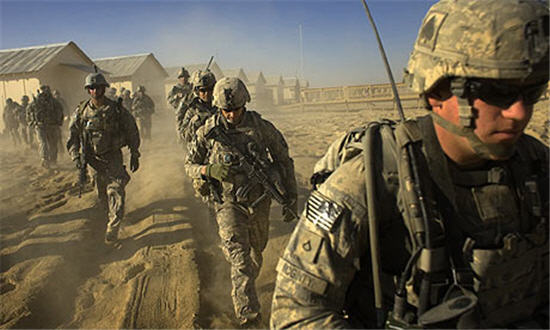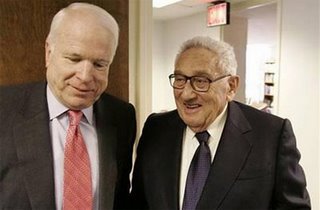War: The Missing Campaign Issue
Tom Brokaw notices something peculiar about the campaign debates: Nobody's talking about Iraq or Afghanistan.
Tom Brokaw notices something peculiar about the campaign debates:
IN what promises to be the most contentious midterm election since 1994, there is no shortage of passion about big issues facing the country: the place and nature of the federal government in America’s future; public debt; jobs; health care; the influence of special interests; and the role of populist movements like the Tea Party.
In nearly every Congressional and Senate race, these are the issues that explode into attack ads, score points in debates and light up cable talk shows. In poll after poll, these are the issues that voters say are most important to them this year.
Notice anything missing on the campaign landscape?
How about war? The United States is now in its ninth year of fighting in Afghanistan and Iraq, the longest wars in American history. Almost 5,000 men and women have been killed. More than 30,000 have been wounded, some so gravely they’re returning home to become, effectively, wards of their families and communities.
In those nine years, the United States has spent more than $1 trillion on combat operations and other parts of the war effort, including foreign aid, reconstruction projects, embassy costs and veterans’ health care. And the end is not in sight.
So why aren’t the wars and their human and economic consequences front and center in this campaign, right up there with jobs and taxes?
The answer is very likely that the vast majority of Americans wake up every day worrying, with good reason, about their economic security, but they can opt out of the call to arms. Unless they are enlisted in the armed services — or have a family member who has stepped forward — nothing much is asked of them in the war effort.
There’s a large grain of truth to that. If there were still a military draft, as we had in Vietnam, there would doubtless be more anger about the wars.
Then again, the Iraq War was a significant issue in the 2008 campaign. One could argue that Barack Obama’s having been opposed to the war from the start was the main programmatic issue separating him from the other major candidates for the Democratic nomination and was the thing that him the nominee rather than Hillary Clinton. And, while it wasn’t the key issue in the general election — by then the economic crisis was afoot — John McCain’s statement that it would be fine if we were still in Iraq in a thousand years (so long as we weren’t taking any more casualties than the troops that have been in South Korea for the past half century) didn’t go over too well, as you may recall.
No, the reasons that the wars in Iraq and Afghanistan aren’t major issues this time around is that the economy is more important to most Americans and there’s a rough bipartisan consensus on these wars. Iraq has gone away as a point of contention because the rate of American casualties has fallen to next to nothing and everyone senses that we’re on our way out with our heads held up relatively high. And, oddly, the elites of both parties both seem to think that we’re unlikely to win in Afghanistan but that we need to give it one more heroic effort before conceding that point. If we’re not either “winning” there or clearly on our way out by early 2012, it’ll certainly be a big issue in that campaign.







Well, those of us who opposed the wars, or supported getting out soon, seem to be giving the rest of you a beak right now.
Maybe it’s because the country as a whole seems to have accepted a timeline. We are getting out, not as soon as we could, but pretty much when US political consensus is reached.
I’d be fine with an exit this week, FWIW. I’d just tell the Iraqis and Afghans “it’s on you at this point.”
I think part of the reason that the war isn’t as big an issue is that the Dems, having control of the government, have control of the war. They “own” it, so to speak but as any observer knows, they don’t want it. So what are they going to say? Look at how great I’m doing this thing that I don’t want to do?
The Republican abandonment of the war, though, is a bit more curious. I understand that priorities shift and the economy is now the big focus, but the economy has been in turmoil for years. The aughts were particularly brutal, ten years of catastrophes (9-11, Katrina) and burst bubbles, capped off at the end by the Great Recession.
It just seems a little strange to abandon a war started in uncertain economic times…and then point to the economy as the reason for abandoning it. There’s gotta be something else going on.
What exactly would be the issue? The Dems as a party have given the enemy their “hide and wait” date. I doubt they want to highlight that though. That date does not have a large part of the populace clamoring for immediate repudiation of the Commander in Chief. So what’s the issue? The time to intimate legislative branch unhappiness with the withdrawal plans will be closer to the date when the conditions on the ground at that time will be relevant to questioning the wisdom of Obama’s decision.
“Maybe it’s because the country as a whole seems to have accepted a timeline. We are getting out, not as soon as we could, but pretty much when US political consensus is reached.”
I think there’s also the unspoken agreement that America won’t get dragged into another shabby attempt at nation building like Iraq and Afghanistan for at least another 15-20, just like after Vietnam.
ponce – i think you are right – the only thing americans agree on about the wars is that things aren’t going to get better in Iraq or Afghan and the current plan is to move out of both without looking like we were defeated in any way. hopefully the lesson learned is that nation building is costly in terms of people, money, and time.
Yep. When I think about Abu Ghraib, innocents killed, unaccountable private contractors, dead and wounded American soldiers, a years-long propaganda coup handed over to the enemy, insane amounts of money spent — all for an aggressive war based on false pretenses — well, I just couldn’t be prouder.
Heads held up relatively high? Relative to what — the Marianas Trench? Even that’s debatable.